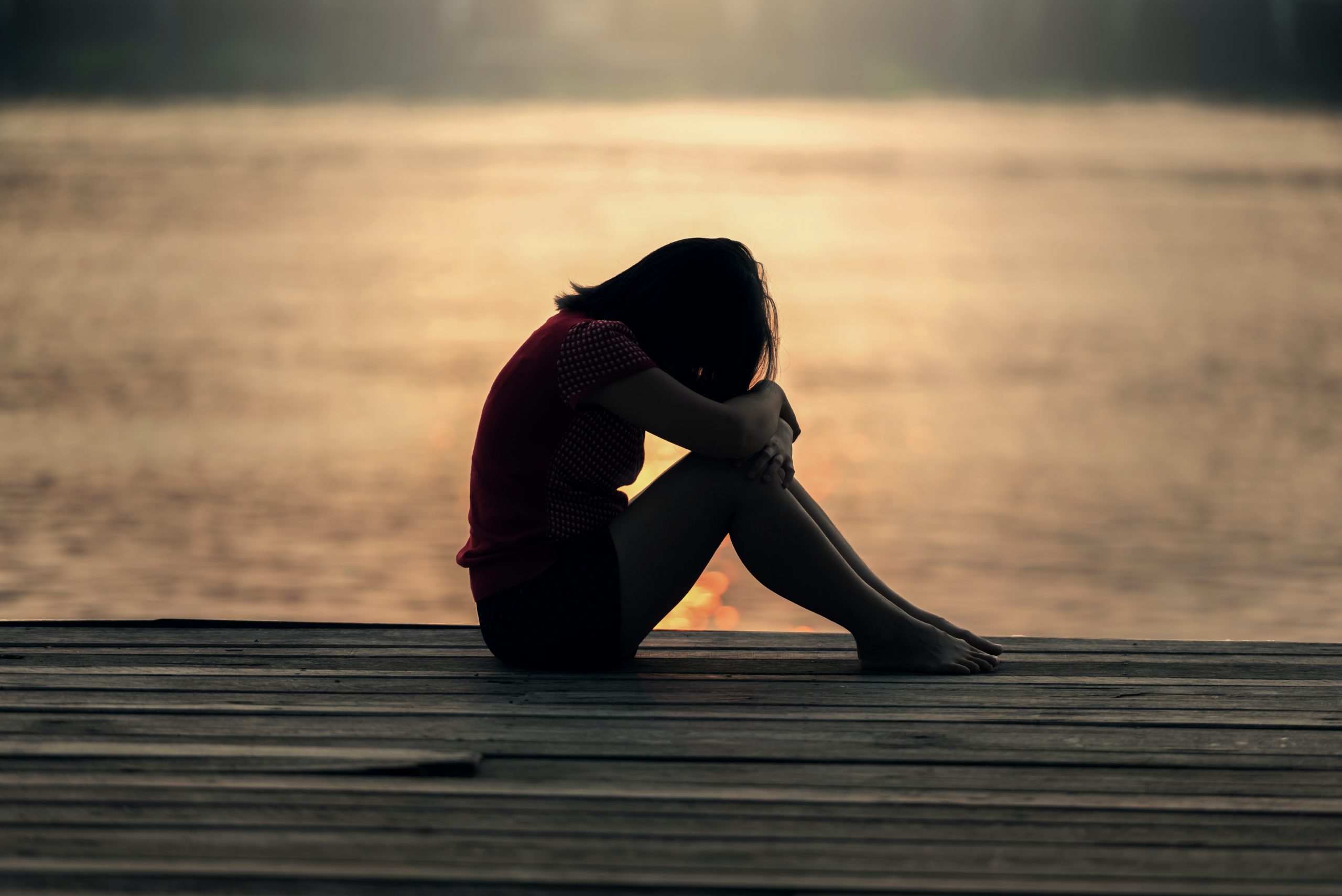For 7 years, she suffered panic attacks in silence
by Christine Leow // August 20, 2021, 4:09 pm

Though the panic attacks became more and more frequent, Sylvie kept quiet about it for a long time. At first, it was because she did not know what they were. But even when she did, she was afraid to tell her parents about it. Image from Pixabay.
“You know the feeling you get when you think you’re going to be hit by a car? That level of fear?
“Imagine having that for half an hour except there is no car. It’s all in your mind, your thoughts creating the fear.”
“I just thought I was crazy. Why is reality so dreadful for me?”
Sylvie (not her real name) said this quietly when she described to Salt&Light what a panic attack felt like to her.
“I would need to scrunch up (my body) and be in a physically safe space. When I was lower functioning, there was some self-harm.”
At its worst, Sylvie would cry uncontrollably. But she could not understand what was happening and she certainly had no name for her experience.
“I just thought I was crazy. Why is reality so dreadful for me?
“I do remember holding the belief that I was less competent at school because of what I was going through. It didn’t matter how I was actually performing on the outside.”
The one or two friends she did confide in wanted to support her but did not know how.
“I didn’t know what I needed either,” she said.
Thriving on the outside, hurting on the inside
The first time Sylvie experienced a panic attack, she was 11. She was preparing for her PSLE a year ahead of time.
“My mum was with me, working on a Maths assessment book.
“Suddenly, I felt overwhelmed by the need to perform during my PSLE and I thought: What if I can’t get into the secondary school I want?
“School was a stressor even when I had good reason not to worry about school work.”
“I started to cry uncontrollably. She didn’t know what was happening. I didn’t know either.”
They stopped working on the Maths problem immediately. In the days to come, her mother would take her out for a meal and give her assurances.
“She even wrote me a letter to comfort me.”
But the breakdown would not be a one-off affair.
The panic attacks would return. At first infrequently in primary school, and then more often in secondary school.
“School was a stressor even when I had good reason not to worry about school work.”
The confident persona she portrayed to the world was a far cry from the real person she was when she was alone.
To cope, Sylvie kept herself busy by being heavily involved in co-curricular activities (CCA) in school. She excelled in her CCAs and was given positions of leadership in school.
But the confident persona she portrayed to the world was a far cry from the real person she was when she was home alone.
“When I stepped down from CCA (to prepare for ‘O’ levels), it was quite a messy process.
“The teachers had good intentions. I was told I needed to do better academically. That contributed to quite a bit of worry about how I was going to perform for my ‘O’ levels.”
It was during this period that the anxiety attacks started happening every night.
In the end, Sylvie did well for her ‘O’ levels by most standards. But she was deeply disappointed that she could only make it to her third choice of junior college.
The situation compounded her anxiety though she continued to hide it well from everyone.
Invisible pain
By junior college, apart from being triggered by school stress, Sylvie developed social anxiety.
None of her friends from secondary school had ended up in the junior college she attended. Alone, she knew she had to try harder to make friends.
“During my JC orientation, I put in extra effort to be bubbly and extroverted.”
But as the weeks wore on, the anxiety set in, compounded by problems at home.
“I couldn’t predict when it was going to come. A few times, it happened in class.”
“I started to feel very anxious in school a lot of the time. I think there were behavioural changes. I didn’t know how to explain to my peers what was happening.
“I started to withdraw and that was probably when I started to feel excluded. I think people didn’t know how to approach me or know what was going on.”
Even as Sylvie isolated herself, eating alone and studying alone, because the thought of people had started to scare her – “I always imagined them bad-mouthing me or noticing that I was behaving weirdly” – she longed to be accepted and loved.
“It was a confusing mix. I was also having discouraging thoughts like I don’t deserve to be here.”
Then, the panic attacks started happening in school though no one noticed.
“I couldn’t predict when it was going to come. A few times, it happened in class. It wasn’t always as intense. By then, I was high functioning enough not to need to explain to anyone.
“When it happened, I would just need to be quiet and focus on something else. So, it wasn’t very visible.”
A faith that held her
“Being a Christian kept me alive,” said Sylvie.
“Even when I was alone, I knew I was never really alone because I knew God was with me. I would cry out to Him, ask Him what’s happening, ask Him for a breakthrough.
“As I searched for relief, I saw God faithfully loving me, being patient and comforting. He was the constant in my life and that kept me going.”
“I knew I was never really alone because I knew God was with me.”
At her lowest, she would cling to the knowledge that God was close to the broken-hearted (Psalm 34:18).
Raised in a Christian family, prayer also sustained her.
“Prayer was a big part of my recovery journey.
“God would also speak to me through worship songs. In stressful times, I would put everything down and go to my keyboard and just soak in His presence.”
A worship leader in charge of youth worship, Sylvie’s favourite song is one by Audrey Assad, Restless.
“There is a line that goes, ‘I am restless until I rest in You’ …”
The family rallied
Still, the anxiety attacks persisted. By university, Sylvie had tried many ways to cope and had tired of them all.
Over the years, she had seen school counsellors who had taught her visualisation techniques and breathing exercises.
“I was told to imagine a safe space, what could I see there, hear, touch. And I was taught to breathe intentionally.”
While the coping mechanisms helped reduce the intensity of the attacks, they did not stop the attacks completely. Triggers such as academic stress continued to affect her and the attacks became more frequent and severe.
“The attacks started to happen in public. It was embarrassing because I couldn’t control it.”
“My parents were quiet for a while. But they gave me the go-ahead to take a leave of absence from school and get medical help.”
It got so bad that Sylvie had to tell her professors because she was having difficulties handling her school work.
“Anxiety confused me,” she said.
Anxiety also prevented her from developing sustained friendships. Her first year in university was a lonely one.
Eventually, Sylvie decided to confide in her parents. She had come to a point where she felt she needed to spend a year away from school and needed their approval.
“I also wanted to try professional help.”
Contrary to her fears, her parents were very supportive.
“They were quiet for a while. But they gave me the go-ahead to take a leave of absence from school and get medical help.”
That came as a surprise to Sylvie because she had always believed that “seeking medical help was a ‘no-no’ for them”.
She went for sessions with a psychologist and was prescribed medicine by a doctor a year later. The medicine helped her mood and remarkably improved her sleep.
“I had not realised how lightly I had been sleeping for years and how much it had affected me.
Having her family on board have helped her tremendously. It has also opened up communication lines at home.
“Sleep is another thing that I struggled with. It’s either too much or too little. After so many years of that, I didn’t realise it was such a big factor to my overall health.”
Proper management and having her family on board have helped her tremendously. It has also opened up communication lines at home.
“We started to get closer and started talking more.”
Now in her final year in university, Sylvie has learnt how to manage her anxiety and is working on a Final Year Project on how Singaporean youth talk about their mental health.
With patience and practice, the panic attacks have also become less intense and less frequent.
“One of the things that was difficult for me was that I had hoped my recovery would be speedier. I just wanted the solutions.
“But the healing process takes time. So, don’t expect to overcome it immediately.
“I’ve learned that I need to have events spread out instead of having a full, back-to-back day and I am learning to be unapologetic about that.”
When she graduates, Sylvie intends to go into the helping profession.
“With my experience with my own mental health journey, I hope to be a wounded healer to serve others going through something similar.”
RELATED STORIES:
Religion plays a key role in wider mental health blueprint: IMH CEO
Religion plays a key role in wider mental health blueprint: IMH CEO
How a woman’s struggle with schizophrenia resulted in a medical care portal for the mentally ill
Burnt out so many times he lost count, now he helps others build mental resilience
WHERE TO FIND HELP
Hotlines
- SOS 24-hour hotline: 1-800-221-444
- Care Corner Counselling Centre: 6353-1180
- Care Corner Parenting Support: 6235-4705
- IMH Mental Health Helpline: 6389-2222 (24-hours)
Counselling
- Care & Counselling Centre
- Email: [email protected]
- Focus on the Family Singapore
- Grace Counselling Centre
- Wesley Counselling
Call Caroline Ong for an appointment: 6837-9214. (Monday-Friday, 9am-6pm) - Haven Counselling Centre: 6559-1528 or email: [email protected]
- Bethel Family Life & Counselling: 6741-2741 (Ps Jean Ong)
Mental Health Directory
Mental Connect
We are an independent, non-profit organisation that relies on the generosity of our readers, such as yourself, to continue serving the kingdom. Every dollar donated goes directly back into our editorial coverage.
Would you consider partnering with us in our kingdom work by supporting us financially, either as a one-off donation, or a recurring pledge?
Support Salt&Light


